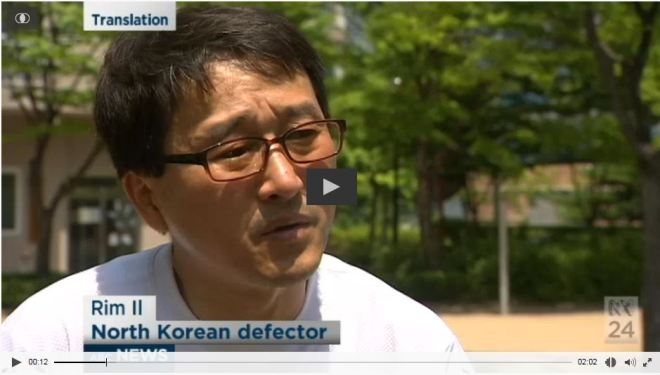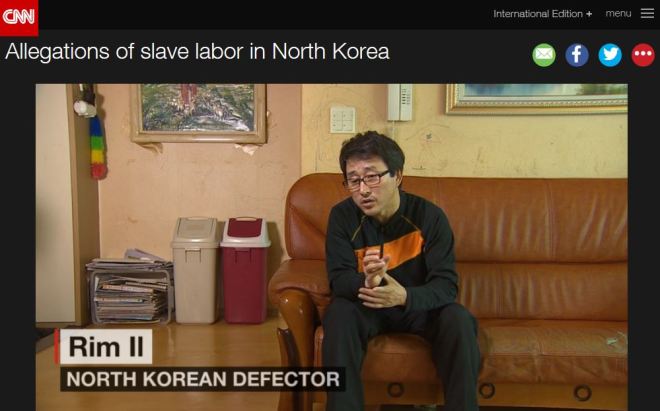FEB. 19, 2015
North Korea Exports Forced Laborers for Profit, Rights Groups Say
Rim Il, a North Korean who says he was sent to work in Kuwait before he defected to South Korea, in Seoul, the South’s capital. Credit Jean Chung for The New York Times
SEOUL, South Korea — When the North Korean carpenter was offered a job in Kuwait in 1996, he leapt at the chance.
He was promised $120 a month, an unimaginable wage for most workers in his famine-stricken country, where most people are not allowed to travel abroad.
But for Rim Il, the deal soured from the start: Under a moonlit night, the bus carrying him and a score of other fresh arrivals pulled into a desert camp cordoned off with barbed-wire fences.
There, 1,800 workers, sent by North Korea to earn badly needed foreign currency, were living together under the watchful eyes of North Korean government supervisors, Mr. Rim said. They worked from 7 a.m. to 7 p.m. or, often, midnight, seven days a week, doing menial jobs at construction sites.
“We only took a Friday afternoon off twice a month but had to spend the time studying books or watching videos about the greatness of our leader back home,” Mr. Rim said at a recent news conference in Seoul, the South Korean capital. “We were never paid our wages, and when we asked our superiors about them, they said we should think of starving people back home and thank the leader for giving us this opportunity of eating three meals a day.”
Tens of thousands of North Koreans work long hours for little or no pay, toiling in Chinese factories or Russian logging camps, digging military tunnels in Myanmar, building monuments for African dictators, sweating at construction sites in the Middle East or aboard fishing boats off Fiji, according to former workers and human rights researchers.
For decades, North Korea has been accused of sending workers abroad and of confiscating most of their wages. But in the years since Kim Jong-un took over as leader, human rights researchers say, the program has expanded rapidly as international sanctions have squeezed the country’s other sources of foreign currency, like illicit trading in missile parts.
A 2012 study by the North Korea Strategy Center, a group in Seoul that works with North Korean defectors, and the private Korea Policy Research Center estimated that 60,000 to 65,000 North Koreans were working in more than 40 countries, providing the state with $150 million to $230 million a year. That number has since grown to 100,000, human rights researchers said.
“North Korea is exploiting their labor and salaries to fatten the private coffers of Kim Jong-un,” said Ahn Myeong-chul, head of NK Watch, a human rights group in Seoul. “We suspect that Kim is using some of the money to buy luxury goods for his elite followers and finance the recent building boom in Pyongyang that he has launched to show off his leadership.”
In a report published late last year, the Seoul-based Asan Institute for Policy Studies said that the revenue from overseas workers helped the North Korean government bypass international sanctions, which have been tightened in recent years.
“Earnings are not sent back as remittances, but appropriated by the state and transferred back to the country in the form of bulk cash,” it said, noting that sanctions ban the transfer of bulk cash to the Pyongyang government. “Returning workers also act as mules to carry hard currency earnings back to North Korea.”
NK Watch has collected the testimony of 13 former North Korean workers now living in South Korea, in support of a petition to the United Nations asking for an investigation into what it calls “state-sponsored slavery.” The petition, to be filed next month to the United Nations’ special rapporteur on contemporary slavery, said the migrants worked a minimum of 12 hours a day, were given a few days off a year, and commonly received only 10 percent of their promised pay, or none at all.
NK Watch said that there had never been an official investigation into the practice and that it was appealing to the United Nations in hopes of building on the work of a report last year that documented widespread human rights abuses inside North Korea. That report led to a recommendation that the Security Council refer North Korea to the International Criminal Court.
North Korea has dismissed the report as false and part of an American-sponsored effort to overthrow its government.
The workers interviewed by NK Watch said they were victims of a chain of exploitation and deception.
They described a system where government minders monitored their movements and communications and required them to spy on one another. The minders often confiscated the workers’ passports.
“These workers face threats of government reprisals against them or their relatives in North Korea if they attempt to escape or complain to outside parties,” the State Department said in a report published last year. “Workers’ salaries are deposited into accounts controlled by the North Korean government, which keeps most of the money, claiming various ‘voluntary’ contributions to government endeavors.”
The Workers’ Party, the ruling party in North Korea, instructed a group in Kuwait to send home $500,000 a month, more than its members’ regular salaries combined, a North Korean supervisor who worked there from 2011 to last year told NK Watch.
Former workers in Kuwait and elsewhere said they were forced to work even longer hours and seek odd jobs in the local community, splitting the earnings with government minders who demanded bribes in return for allowing them such opportunities.
One worker told NK Watch that he received only $160 in the three years he worked in a Siberian logging camp in the 1990s, toiling up to 21 hours a day in temperatures often colder than minus 20 degrees Fahrenheit.
He was told the rest of his wages were sent home to his family. But families were given only coupons for state-owned stores, where there was often nothing to buy, former workers said.
Still, in North Korea, the opportunity to work overseas was considered such a privilege that the jobs had to be bought with bribes. Former workers said their biggest fear was when supervisors threatened to send them home when they failed to meet exorbitant production targets or offer bribes. And compared with many of their compatriots at home, they were well fed.
“Once, we were eating our bowls of rice, and one guy broke into tears thinking of his starving children back home, and we all wept together,” said a North Korean defector who worked in a Russian logging camp from 2000 to 2001. He gave only his last name, Kim, for fear of reprisal against relatives who are still in the North.
Mr. Kim said he earned $5.30 a day during the winter logging season. He later learned that Chinese and Russian workers were earning $30 a day for doing much less.
Kim Yoon-tae, a researcher on North Korean human rights, said that the international community could pressure countries that use North Korean labor to honor basic international standards for labor protection, including an end to the practice of giving workers’ salaries to the government.
Mr. Rim said he was paid in cash only once during the five months he worked in Kuwait before he escaped into the South Korean Embassy there in 1997. To celebrate the birthday of Kim Jong-il, Kim Jong-un’s father and predecessor, supervisors gave each worker about $65 to buy cigarettes.
“Our life was nothing but slavery,” Mr. Rim said.





![[ESSAY] 내 고향 북한의 설](https://i0.wp.com/image.chosun.com/sitedata/image/201602/02/2016020203754_1.jpg)